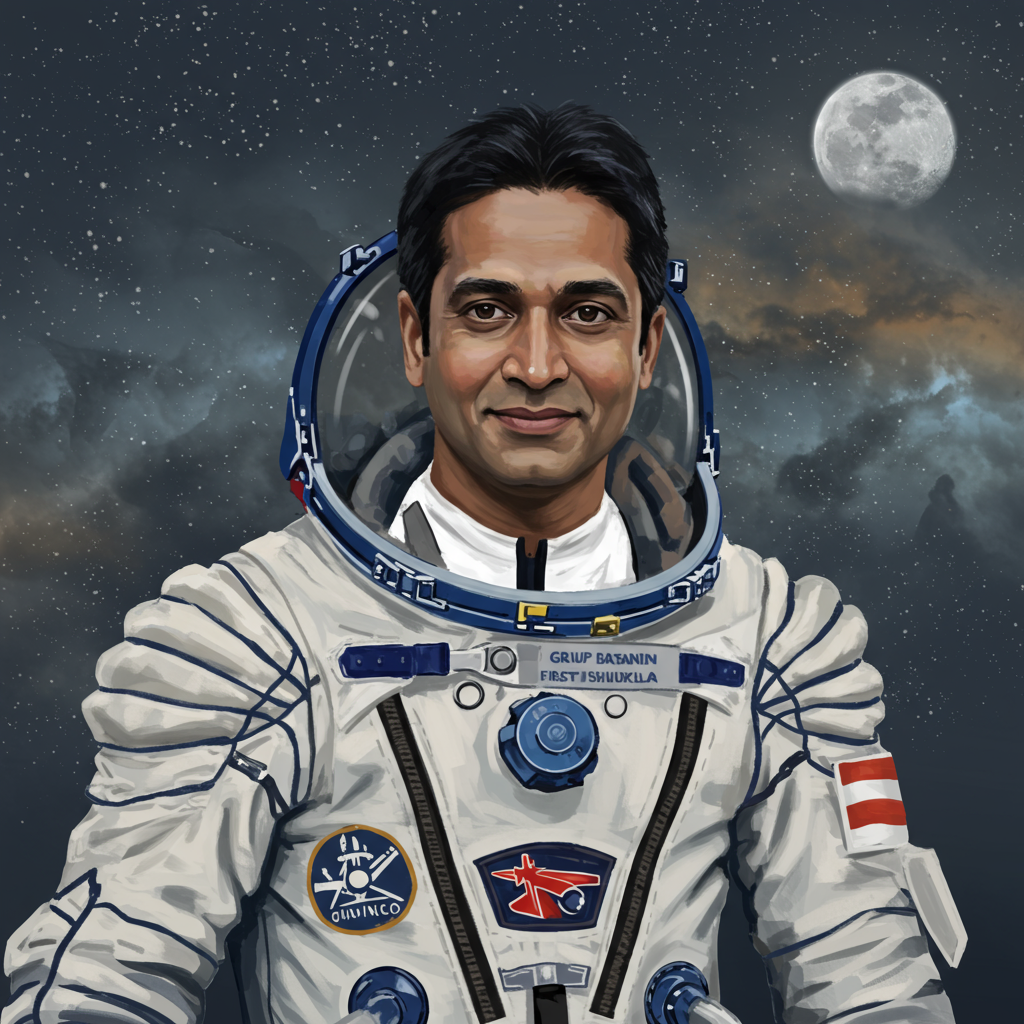India celebrates a monumental moment in its space history as Group Captain Shubhanshu Shukla successfully concludes his pioneering mission aboard the International Space Station (ISS). Becoming the first Indian national ever to reach the orbiting laboratory, his safe return marks a significant step forward for the nation’s ambitious space endeavors. After an impactful stay focused on critical research and outreach, Group Captain Shukla’s journey back to Earth is a symbol of India’s growing capabilities and determination in human spaceflight. His mission, Axiom-4 (Ax-4), a privately funded collaboration, demonstrates the evolving landscape of space exploration and India’s place within it.
A Historic Journey Concludes
Group Captain Shubhanshu Shukla made history not just by visiting the ISS, but by being the first Indian to do so. His journey aboard the Axiom-4 mission brought him to the International Space Station, a feat achieved 41 years after Wing Commander Rakesh Sharma became the first Indian citizen in space aboard a Soviet Soyuz spacecraft in 1984. While Sharma’s flight was part of an intergovernmental program, Shukla’s mission is notable as a commercial space venture, highlighting a new era of accessibility to space.
The Ax-4 mission, operated by Houston-based private firm Axiom Space, represents a collaboration involving NASA, India’s space agency ISRO, the European Space Agency (ESA), and SpaceX. This multinational effort saw Group Captain Shukla serve as the mission’s pilot. He was joined by a distinguished crew: former NASA veteran Peggy Whitson, who commanded the mission, and mission specialists Slawosz Uznanski-Wisniewski from Poland and Tibor Kapu from Hungary. This crew marked the first time in over four decades that individuals from these three nations journeyed into orbit together on a single mission.
The Ax-4 crew launched from NASA’s Kennedy Space Center in Florida on June 25, 2025, and successfully docked with the International Space Station on June 26, 2025. Originally planned for a two-week stay, their mission was extended by a few days, resulting in a total of 18 days spent aboard the orbiting laboratory.
Life and Work Aboard the Orbiting Laboratory
During their nearly three-week tenure on the ISS, the Ax-4 crew engaged in intensive scientific research and conducted numerous experiments. The mission facilitated approximately 60 scientific studies and activities, representing contributions from 31 different countries. This diverse portfolio included investigations into human health, space agriculture, psychological well-being, and testing advanced materials.
Notably, seven of these critical experiments were designed by the Indian Space Research Organisation (ISRO). Group Captain Shukla was actively involved in these studies, which included research proposed by Indian national R&D laboratories and academic institutions. One specific experiment focused on skeletal muscle degradation in microgravity, a vital area for understanding the long-term effects of space travel on the human body. Another project Group Captain Shukla worked on involved testing glucose monitors in the unique environment of space. This research holds particular significance, potentially paving the way for individuals with diabetes to participate in future spaceflights.
Beyond the scientific workload, the Ax-4 crew also participated in extensive public outreach activities. This included fielding calls from their respective countries’ leaders, such as an interaction with Indian Prime Minister Narendra Modi, and engaging with students via methods like ham radio. These interactions helped bring the reality of spaceflight closer to people on Earth and underscored the international and inspirational aspects of the mission.
Group Captain Shukla himself commented on the profound impact of witnessing humanity’s collective efforts in space. He reflected that seeing people from different parts of the world working together for a common goal was “truly a miracle,” highlighting the unifying power of space exploration. The mission underscored that its “far-reaching implications” extend well “beyond science,” fostering global cooperation and shared ambition.
A Nation’s Pride: Reflections from Orbit
As his time aboard the ISS drew to a close, Group Captain Shubhanshu Shukla shared poignant reflections during a farewell address. He described his experience as an “incredible journey” and acknowledged that while his mission was concluding, India’s broader journey in human space exploration was “very long and difficult.” Yet, he added a powerful message of hope and determination: “But if we are determined, even the stars are attainable.”
Drawing a parallel to Rakesh Sharma’s famous response to how India looked from space — quoting the Urdu song “Sare jahan se achcha” (better than the rest of the world) — Group Captain Shukla offered his own contemporary perspective. He stated, “From space, today’s India looks ambitious. It looks fearless. It looks confident. It looks proud.” He reiterated, echoing Sharma’s sentiment, that “today’s India still looks better than the rest of the world” from his vantage point high above the planet.
These words resonated deeply in India, capturing the spirit of a nation pushing the boundaries of science and technology. Group Captain Shukla had carried the “hopes and dreams of a billion hearts” with him into orbit, a responsibility he embraced fully. His pre-launch description of the past year as “nothing short of transformative” now takes on added meaning with the successful completion of his space mission.
The Return Journey: Undocking and Splashdown
The process of returning from the International Space Station is a complex sequence of events. The Axiom-4 mission undocked from the ISS on Monday, July 14, 2025. A live broadcast allowed people across the globe to witness the spacecraft’s detachment from the orbiting laboratory after the crew had taken their places inside and the hatches were closed.
The journey back to Earth aboard the SpaceX Dragon capsule is expected to take just under 24 hours, involving de-orbit burns, orbit-lowering maneuvers, and re-entry into Earth’s atmosphere. The mission is scheduled to conclude with a splashdown in the Pacific Ocean off the coast of Southern California on Tuesday, July 15, 2025. Indian Science Minister Jitendra Singh confirmed the splashdown was anticipated around 15:00 India time (09:30 GMT).
Upon their return, the crew, including Group Captain Shukla, will undergo a period of medical evaluation and rehabilitation. This typically involves about a week under the supervision of flight surgeons to help their bodies readapt to Earth’s gravity after the effects of prolonged microgravity exposure.
Back home in India, particularly in his hometown of Lucknow, anticipation for Group Captain Shukla’s return was palpable. His family expressed immense happiness and relief at his imminent arrival. His mother shared her emotional countdown and plans for a grand welcome, including preparing all of his favorite home-cooked meals – a simple, yet profound detail highlighting the human element of this extraordinary journey.
Paving the Way for India’s Space Future
Group Captain Shubhanshu Shukla’s mission holds immense strategic importance for India’s burgeoning space program. ISRO reportedly invested 5 billion rupees ($59m; £43m) to secure his seat on Ax-4 and cover his training. This significant investment underscores the value placed on the hands-on experience gained by an Indian astronaut aboard the ISS.
This experience is considered crucial for preparing for India’s ambitious domestic human spaceflight program, Gaganyaan. Group Captain Shukla is one of four Indian Air Force officers who were shortlisted last year to potentially travel on the Gaganyaan mission. This program aims to launch India’s first-ever crewed space flight, currently targeted for 2027.
India’s aspirations in space do not stop with Gaganyaan. ISRO has outlined further bold plans, including the establishment of its own space station by 2035 and sending an astronaut to the Moon by 2040. Group Captain Shukla’s successful mission to the ISS provides invaluable data, training insights, and operational experience that will directly support these long-term goals. His journey symbolizes not just a personal achievement, but a national leap forward in building the capabilities required for independent human space exploration. The mission cargo, returning over 580 pounds of equipment and research samples, including those from the seven ISRO experiments, will provide further data crucial for future Indian missions.
The successful return of Group Captain Shubhanshu Shukla from the International Space Station marks a triumphant moment for India. His historic journey, filled with scientific inquiry, international cooperation, and national pride, has inspired millions. As India looks towards its future in space, building towards Gaganyaan and beyond, the experience gained from the Ax-4 mission will undoubtedly serve as a vital foundation. His safe return is not just the end of a mission, but the beginning of a new chapter in India’s space story, proving that with determination, even the stars are within reach.
Frequently Asked Questions
What is the significance of Group Captain Shubhanshu Shukla’s mission?
Group Captain Shubhanshu Shukla holds the historic distinction of being the first Indian astronaut to visit the International Space Station (ISS). He is also the second Indian citizen ever to go to space, following Wing Commander Rakesh Sharma’s mission in 1984. His journey aboard the commercial Axiom-4 mission is considered crucial for India’s future human spaceflight plans, particularly providing hands-on training and experience for the upcoming Gaganyaan program.
What kind of experiments did Group Captain Shukla participate in on the ISS?
During the Axiom-4 mission, Group Captain Shukla and his crewmates conducted approximately 60 scientific experiments representing contributions from multiple countries. Seven of these were specifically designed by ISRO. The research covered various fields, including human health studies like skeletal muscle degradation and testing glucose monitors in microgravity, space agriculture, and testing new materials.
How does this mission support India’s future space exploration goals?
ISRO’s investment in Group Captain Shukla’s mission to the ISS is primarily aimed at gaining invaluable operational experience and training for its Gaganyaan program, India’s first planned human spaceflight mission targeted for 2027. This mission is a critical step in building India’s capability for independent human space exploration and contributes to the nation’s long-term goals, such as establishing a space station by 2035 and sending an astronaut to the Moon by 2040.
Word Count Check: Approximately 1200 words.


